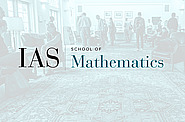Seminars Sorted by Series
Computer Science/Discrete Mathematics Seminar I
Feb
16
2015
Computer Science/Discrete Mathematics Seminar I
2-Server PIR with sub-polynomial communication
Sivakanth Gopi
11:15am|S-101
Feb
23
2015
Computer Science/Discrete Mathematics Seminar I
Lower bounds for clique vs. independent set
11:15am|S-101
Mar
02
2015
Computer Science/Discrete Mathematics Seminar I
Effective-resistance-reducing flows, spectrally thin trees and asymmetric TSP
Shayan Oveis Gharan
12:30pm|S-101
Mar
09
2015
Computer Science/Discrete Mathematics Seminar I
Strong contraction and influences in tail spaces
Elchanan Mossel
11:15am|West Bldg. Lect. Hall
Mar
16
2015
Computer Science/Discrete Mathematics Seminar I
Tight hardness of the non-commutative Grothendieck problem
11:15am|S-101
Mar
23
2015
Computer Science/Discrete Mathematics Seminar I
Random walks that find perfect objects and the Lovász local lemma
Dimitris Achlioptas
11:15am|S-101
Mar
30
2015
Computer Science/Discrete Mathematics Seminar I
Intelligent learning: similarity control and knowledge transfer
Vladimir Vapnik
11:15am|S-101
Apr
06
2015
Computer Science/Discrete Mathematics Seminar I
Natural algorithms for flow problems
Nisheeth Vishnoi
11:15am|S-101
Apr
13
2015
Computer Science/Discrete Mathematics Seminar I
A new approach to the sensitivity conjecture
11:15am|S-101
Sep
21
2015
Computer Science/Discrete Mathematics Seminar I
Explicit two-source extractors and resilient functions I
11:15am|S-101
Sep
28
2015
Computer Science/Discrete Mathematics Seminar I
Ramsey numbers of degenerate graphs
Choongbum Lee
11:15am|S-101
Oct
05
2015
Computer Science/Discrete Mathematics Seminar I
Is optimization computationally equivalent to online learning?
Elad Hazan
11:15am|West Bldg. Lect. Hall
Oct
12
2015
Computer Science/Discrete Mathematics Seminar I
Factors of polynomials of low individual degree
Rafael Oliveira
11:15am|S-101
Oct
19
2015
Computer Science/Discrete Mathematics Seminar I
No seminar today: FOCS
No seminar today: FOCS
11:15am|S-101
Oct
26
2015
Computer Science/Discrete Mathematics Seminar I
Random words, longest increasing subsequences, and quantum PCA
John Wright
11:15am|S-101
Nov
02
2015
Computer Science/Discrete Mathematics Seminar I
Two-source dispersers for polylogarithmic entropy and improved Ramsey graphs I
11:15am|S-101
Nov
09
2015
Computer Science/Discrete Mathematics Seminar I
Cutting plane method: A faster algorithm for many (combinatorial) optimization problems
Yin Tat Lee
11:15am|S-101
Nov
16
2015
Computer Science/Discrete Mathematics Seminar I
How quaternion algebras over number fields are useful for creating compiler for a quantum computer?
Vadym Kliuchnikov
11:15am|S-101
Nov
23
2015
Nov
30
2015
Computer Science/Discrete Mathematics Seminar I
Lower bounds on the size of semidefinite programming relaxations
11:15am|S-101
Dec
07
2015
Computer Science/Discrete Mathematics Seminar I
Bias vs low rank of polynomials with applications to list decoding and effective algebraic geometry
Abhishek Bhowmick
11:15am|West Bldg. Lect. Hall
Dec
14
2015
Computer Science/Discrete Mathematics Seminar I
Toward the KRW conjecture: cubic lower bounds via communication complexity
11:15am|S-101
Jan
25
2016
Computer Science/Discrete Mathematics Seminar I
Seminar cancelled on account of snow.
Seminar cancelled on account of snow.
11:15am|S-101
Feb
01
2016
Computer Science/Discrete Mathematics Seminar I
Constant-round interactive-proofs for delegating computations
Ron Rothblum
11:15am|S-101
Feb
08
2016
Computer Science/Discrete Mathematics Seminar I
Bipartite perfect matching is in quasi-NC
Stephen Fenner
11:15am|S-101
Feb
22
2016
Computer Science/Discrete Mathematics Seminar I
The deterministic communication complexity of approximate fixed point
Omri Weinstein
11:15am|S-101
Feb
29
2016
Computer Science/Discrete Mathematics Seminar I
Graph isomorphism in quasipolynomial time I
László Babai
11:15am|Wolfensohn Hall
Mar
07
2016
Computer Science/Discrete Mathematics Seminar I
Almost optimal sum of squares lower bound for planted clique
11:15am|S-101
Mar
14
2016
Computer Science/Discrete Mathematics Seminar I
Lower bounds for homogeneous depth-5 arithmetic circuits over finite fields
Mrinal Kumar
11:15am|S-101
Mar
21
2016
Computer Science/Discrete Mathematics Seminar I
Polynomial-time tensor decompositions via sum-of-squares
Tengyu Ma
11:15am|S-101
Mar
28
2016
Computer Science/Discrete Mathematics Seminar I
A local central limit theorem for triangles in a random graph
11:15am|West Building Lecture Hall
Apr
04
2016
Computer Science/Discrete Mathematics Seminar I
An average-case depth hierarchy theorem for Boolean circuits I
Li-Yang Tan
11:15am|S-101
Sep
26
2016
Computer Science/Discrete Mathematics Seminar I
Counting solutions to random constraint satisfaction problems
Allan Sly
11:15am|S-101
Oct
17
2016
Computer Science/Discrete Mathematics Seminar I
Matrix invariants and algebraic complexity theory
Harm Derksen
11:15am|S-101
Oct
24
2016
Computer Science/Discrete Mathematics Seminar I
On the query complexity of Boolean monotonicity testing
11:15am|S-101
Oct
31
2016
Computer Science/Discrete Mathematics Seminar I
Communication complexity of approximate Nash equilibria
Aviad Rubinstein
11:15am|West Building Lecture Hall
Nov
07
2016
Computer Science/Discrete Mathematics Seminar I
Non-unique games over compact groups and orientation estimation in cryo-EM
Amit Singer
11:15am|S-101
Nov
14
2016
Nov
21
2016
Computer Science/Discrete Mathematics Seminar I
On the effect of randomness on planted 3-coloring models
Uri Feige
11:15am|S-101
Nov
28
2016
Computer Science/Discrete Mathematics Seminar I
Stochastic block models and probabilistic reductions
11:15am|S-101
Dec
05
2016
Computer Science/Discrete Mathematics Seminar I
On the number of ordinary lines determined by sets in complex space
11:15am|S-101
Dec
12
2016
Computer Science/Discrete Mathematics Seminar I
On gradient complexity of measures on the discrete cube
Ronen Eldan
11:15am|S-101
Jan
17
2017
Computer Science/Discrete Mathematics Seminar I
The polynomial method and the cap set problem
Jordan Ellenberg
10:30am|S-101
Jan
23
2017
Computer Science/Discrete Mathematics Seminar I
Active learning with \"simple\" membership queries
11:15am
Jan
30
2017
Computer Science/Discrete Mathematics Seminar I
Quantifying tradeoffs between fairness and accuracy in online learning
Aaron Roth
11:15am
Feb
06
2017
Computer Science/Discrete Mathematics Seminar I
Strongly Refuting Random CSPs below the spectral threshold
Prasad Raghavendra
11:15am
Feb
13
2017
Computer Science/Discrete Mathematics Seminar I
Nearest neighbor search for general symmetric norms via embeddings into product spaces
Ilya Razenshteyn
11:30am
Feb
27
2017
Computer Science/Discrete Mathematics Seminar I
New insights on the (non)-hardness of circuit minimization and related problems
Eric Allender
11:15am
Mar
06
2017
Computer Science/Discrete Mathematics Seminar I
Interactive coding with nearly optimal round and communication blowup
Yael Kalai
11:15am
Mar
13
2017
Computer Science/Discrete Mathematics Seminar I
On the cryptographic hardness of finding a Nash equilibrium
Nir Bitansky
11:15am
